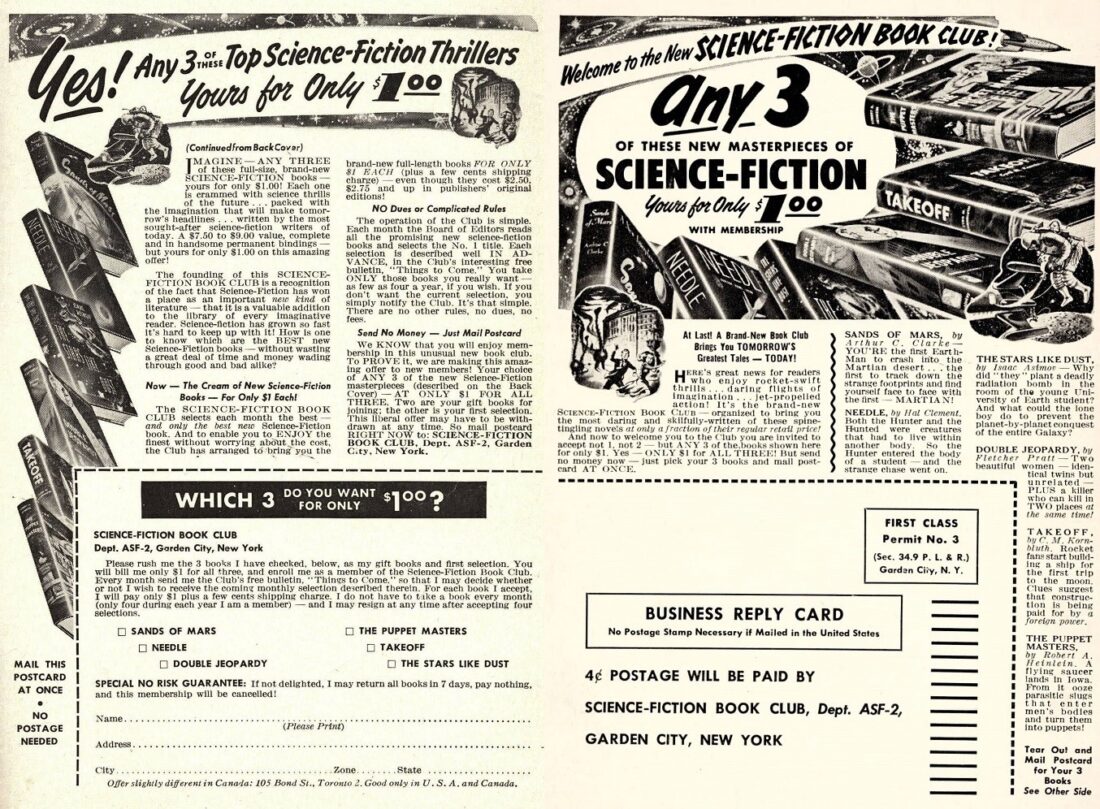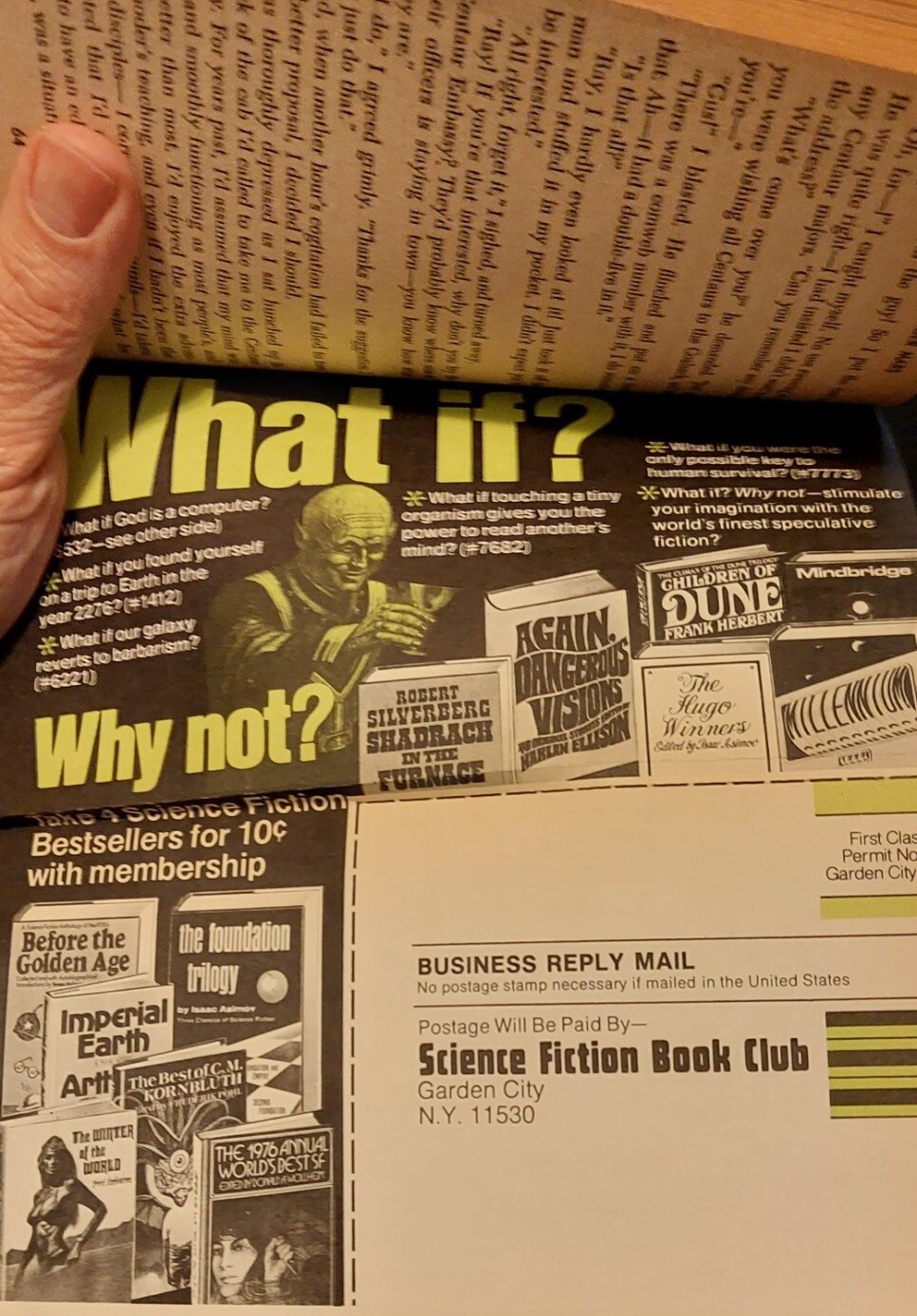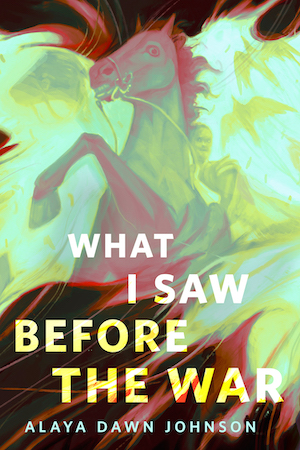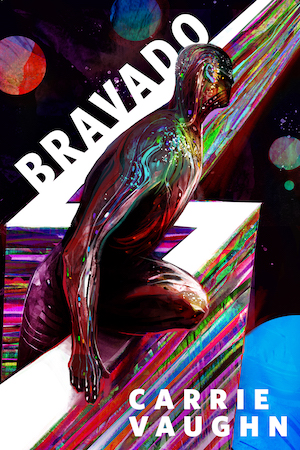The January Ansible features this distressing note:
Publishers and Sinners. The US Science Fiction Book Club, now owned by Bookspan, is apparently shutting down. A December notice on the SFBC website warned that orders will no longer be processed after 2 January 2025, with the strong implication that subscribers’ accumulated ‘Member Credits’ would vanish if not used by then. [F770]
If the announcement does indeed signal the end of the Science Fiction Book Club1, that is a great pity. The SFBC was, in its time, of tremendous importance to SF fans like me2, a great institution of the field whose demise should be acknowledged and mourned3.
Originally an imprint of Nelson Doubleday, Inc., the SFBC first appeared in 19534, offering subscribers affordable hardcover science fiction and fantasy books. It just so happens that I have handy a list of the first books reprinted by the SFBC5. These were:
- Double Jeopardy, Fletcher Pratt
- Needle, Hal Clement
- Rogue Queen, L. Sprague De Camp
- The Astounding Science Fiction Anthology, ed. John W. Campbell, Jr.
- The Day of the Triffids, John Wyndham
- The Illustrated Man, Ray Bradbury
- The Martian Chronicles, Ray Bradbury
- The Mixed Men, A.E. Van Vogt
- The Puppet Masters, Robert A. Heinlein
- The Sands of Mars, Arthur C. Clarke
- The Stars Like Dust, Isaac Asimov
- Takeoff, C.M. Kornbluth
Members could buy three of these classics for a single American dollar! Which then had the buying power of about $11 (2024 USD), which was still significantly cheaper than the $2.50 (which would have been $30 in 2024 USD) a single regular hardcover would have cost.

A reader of my vintage would likely have encountered the SFBC via ads in magazines or more memorably, sturdy cardboard ad inserts in mass market paperbacks.

These were solidly bound into the books and removing them would destroy the paperback. Luckily, the order form was a tearaway that could be removed safely. To give you an idea of how durable those inserts were, the early 21st century SFBC was still getting 1970-era insert order forms mailed in by optimists hopeful that thirty-year-old offers would still be valid.
The SFBC books were invaluable for a number of reasons. They made available reprinted hardcover editions at a price far lower than regular hardcovers. This helped stretch limited book-buying budgets (although it made the shelving issue more difficult. Hardcovers take up more space than paperbacks).
As they were mail order, SFBC books were available to isolated readers where other books were not. Decades ago, books were not available at the click of a button. Most books reached readers via brick-and-mortar bookstores and not every town had one of those.
While not every book offered was a timeless classic—don’t ask me what Pratt’s Double Jeopardy was about—enough of the novels, collections, and anthologies on offer were classics, such that an SFBC subscription was an excellent way to become familiar with the American science fiction field as a whole6. Editor Ellen Asher in particular had a keen eye for science fiction and fantasy7.
Another advantage for the scheme: the SFBC embraced an order system seemingly calculated to take advantage of procrastinators and other disorganized people. Monthly selections were dispatched automatically unless the member remembered to send in a form requesting that month’s selection not be sent out. The advantage to the SFBC is obvious. The advantage to the subscriber was that they had the opportunity to read books they might otherwise have never thought to try. In this case, sloth equaled serendipity.
The Science Fiction Book Club and the affordable hardcovers they offered enabled my relentless science fiction addiction expanded my access to science fiction and fantasy. Without the SFBC, my tastes in SF would no doubt be very different than they are, if indeed I had not left SFF behind entirely. I have no doubt this is true for other readers as well. Therefore, if these are indeed the SFBC’s final days, I mourn its passing8.
- “The” is a bit misleading, as there have been a number of organizations that used the name Science Fiction Book Club. I am referring to the American SFBC.
- Of course, the SFBC was of particular importance to me as it was the first company to pay me to read and review books.
- Unless it turns out the SFBC isn’t dead and we’re all overreacting, in which case pretend this is a piece about all the films in which Sean Bean’s character died or something.
- A curious fact discovered during the SFBC’s 50th anniversary was that apparently the name of the person who founded it was so well known in 1953 that nobody at SFBC saw fit to write it down for the benefit of later generations. I believe the editor was (probably) Walter Bradbury but I could be wrong.
- Along with every book published by them up to 2001.
- In the 21st century, the SFBC produced original anthologies, whose genesis may be found here.
- Not to snub the other SFBC stalwarts, but Asher isn’t praised half as much as she should be.
- Unless the reports of the SFBC’s death are an exaggeration, in which case, wow, Sean Bean sure has played a lot of characters who died, hasn’t he?










